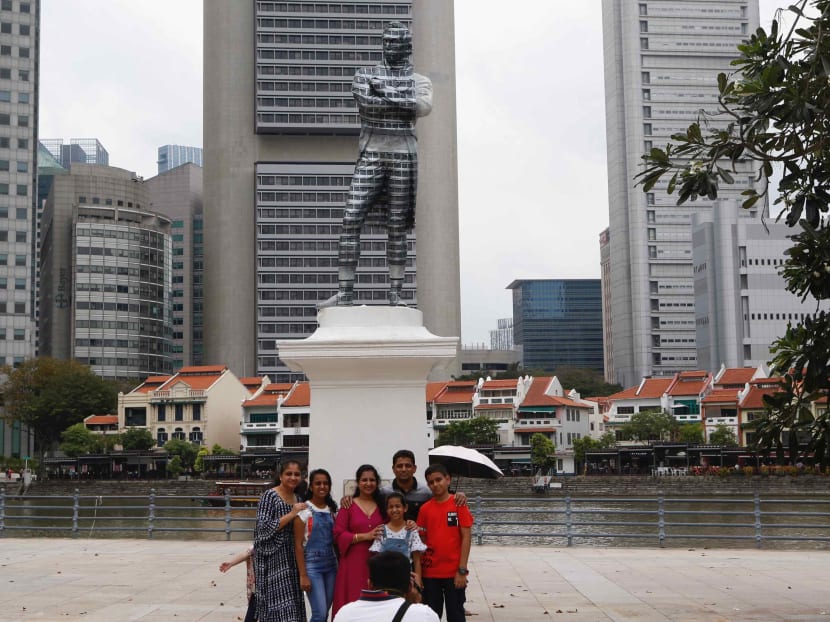This bicentennial, let's take a more nuanced view of colonialism
Some Singaporeans have questioned the rationale of commemorating the bicentennial of Singapore’s founding by the British under Sir Stamford Raffles. I would urge fellow Singaporeans to take a more nuanced view of colonialism and its place in history.

People posing in front of an optical illusion involving the statue of Sir Stamford Raffles. The author notes that there is a wide range of colonial experiences across the world, and in some cases, Western colonisation have left a positive legacy.
2019 marks the bicentennial of Singapore’s founding by the British under Sir Stamford Raffles. The government has itself created a Bicentennial Office under the Prime Minister’s Office and it is planning a series of public events to commemorate this milestone and Singapore’s longer 700-year history.
There is however, some concern amongst the public about the rationale for these celebrations.
Some have questioned why we should be celebrating, especially with taxpayers dollars, what is essentially colonialism and exploitation by a foreign power.
The commentator Neil Humphreys had said that “praising Raffles acknowledges a white man’s superiority over repressed colonial subjects”. Another writer in an alternative publication called Raffles “a hypocrite…who was incapable of managing a Gong Cha outlet, let alone Singapore”.
In the spirit of constructive discussion, I would urge fellow Singaporeans to take a more nuanced view of colonialism and its place in history.
While one should rightly acknowledge the faults and injustices of colonial rule in history, one should also note the wide range of colonial experiences that vary from place to place, and some of the ways in which colonialism has also positively shaped the modern world we live in.
As a political economist, I am used to conducting a comparative institutional analysis, which just means looking at how social, economic and political structures change and evolve across time and place. This leads one to the realisation that colonial experiences differ markedly.
One factor explaining the difference would be the varied strategies of rule used by the Western colonial powers.
It would be a historical mistake to conflate the colonial experiences of Hong Kong and Singapore, for instance, where the predominantly Chinese population for the most part flourished under the British, with that of the French Indochina, Dutch East Indies and the Belgian Congo, where repression was rife, and atrocities commonplace.
This means that in certain circumstances, Western colonisation can leave a positive legacy.
In fact, the institutional economists Daron Acemoglu and James Robinson, authors of the famous book “Why Nations Fail”, wrote in their journal article "Colonial Origins of Comparative Development" that in areas where disease environments were favourable, Europeans established pro-growth institutions like private property and the rule of law.
These eventually contributed to economic success, whereas in other areas, extractive institutions persist, trapping societies in poverty over time.
Of course, it also bears remembering that imperialism and colonisation are not solely Western phenomena.
Japan colonised Taiwan in 1895, Korea in 1910 and other parts of Asia in the early 20th century. The Ottoman empire, based on Persian, and not Western culture, spanned more than five centuries and covered a large swathe of territories.
Once we peer farther back in history, instances of imperial power projected from one society to another are aplenty. Yet, it is undeniable that we live in a world shaped by Western imperialism.
The British Empire stands out in particular, not only due to its wide territorial reach under the Victorian era, but due to the way in which Anglo-Saxon values and institutions have shaped our modern world.
These include the English language, the common law tradition, constitutionalism and the rule of law, capitalism based on property and competition, and modern parliamentary democracy.
Accordingly, historians like David Landes, Douglass North, Daniel Hannan and James C Bennett have explained that former British colonies tend to be more economically successful than other counterparts. The United States of America, once a British colony, has today become a hegemonic imperial power, of sorts.
Singapore and Hong Kong are also excellent examples, and are today global city-states that have continued in the British tradition of open trade and immigration.
Significant segments of Hong Kong society also expressed fondness for British rule during the 1997 handover. Other former colonies in the Anglosphere include even Jamaica and Botswana, two success stories in a continent that has typically fallen behind.
We take these institutions for granted because they are so widespread, almost as if they are timeless features of our world. Yet they originated from a specific time and place.
The historian Niall Ferguson put this best: “Without the spread of British rule around the world, it is hard to believe that the structures of liberal capitalism would have been so successfully established in so many different economies around the world.”
This bicentennial does not have to be seen as a crude apology for colonialism in its totality.
We can acknowledge its faults, but yet realise that colonialism has many faces, some of which have most intimately shaped our world and everyday lives.
ABOUT THE AUTHOR:
Bryan Cheang is Director of the Adam Smith Center, a pro-competition, non-profit organisation in Singapore.









